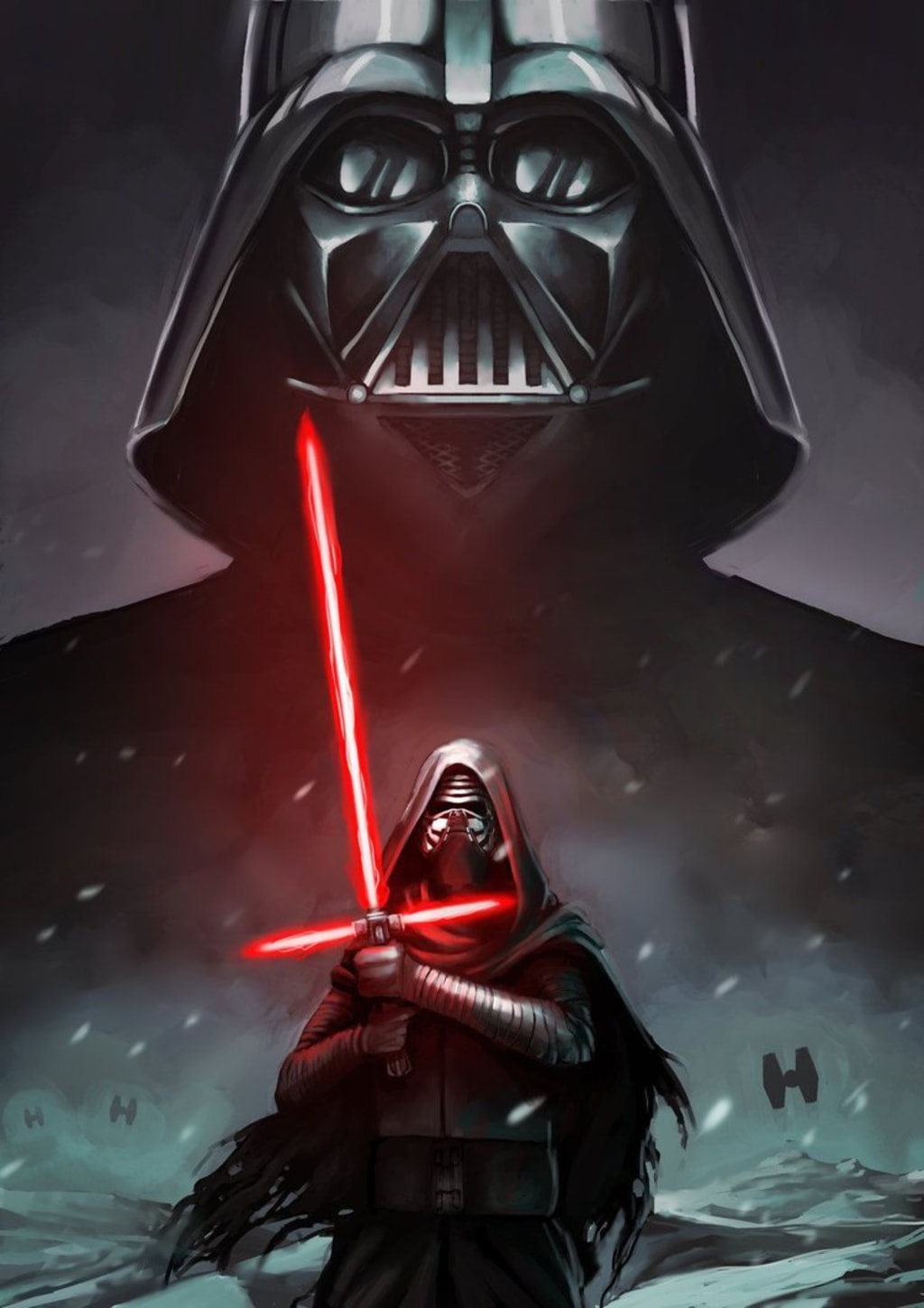Were Darth Vader And Kylo Ren Actually Redeemed?
Out Of The Dark Side, Into The Light

The story of Star Wars always has been about the eternal struggle of good vs. evil, heroes vs. villains. However, as the storylines of Star Wars have expanded throughout the years, so have the moral dimensions of various characters. Several characters introduced in the movies and series started out as villains, but later changed sides, or at least became occasional allies to the heroes or were less “black and white” in terms of their morality. I will primarily focus on the major villains-turned-heroes of the Skywalker Saga, specifically Darth Vader and Kylo Ren, and whether they deserve to be considered redeemed.
In the Original Trilogy, we are introduced to the Galactic Empire and its servants, chiefly Darth Vader, the villainous Dark Lord of the Sith. Vader was not necessarily the primary villain in A New Hope - he served more as an enforcer under the command of other Imperial officials; nevertheless, Vader was definitely the most fearsome of all the villains introduced in A New Hope. He threatened the survival of all the heroes at one point or another in the film and even killed his former Jedi Master, Obi-Wan Kenobi.
In The Empire Strikes Back, Vader was fleshed out even more and became the primary villain of the story. He stalked the Rebels relentlessly throughout the movie, which culminated with Vader capturing Han Solo and freezing him in carbonite, then dueling with Luke Skywalker, when he revealed he is actually Luke's father Anakin Skywalker, whom Luke was previously led to believe was dead.
With this knowledge in mind, Luke sought Vader in Return of the Jedi in order to attempt to turn Vader back to the light side of the Force, a feat that Vader’s villainous and scheming master, Emperor Palpatine (aka Darth Sidious) claimed was impossible. After a pitched duel wherein Luke overpowered Vader in a fit of rage and fear, Luke threw down his lightsaber and decisively rejected the Emperor’s entreaties to join him and take Vader’s place. The Emperor became enraged and attacked Luke viciously with Force Lightning with the intent to kill him. At that moment, however, Vader, while seeing his son being tortured to death by the Emperor, chose to kill the Emperor and save Luke at the cost of his own life. At the conclusion of the film, Vader joined his fellow Jedi comrades, Yoda and Obi-Wan Kenobi, as the Force Ghost of Anakin Skywalker, which appeared to signal his redemption.
Related: 10 Times Darth Vader Proved He Should Be Feared
The Star Wars Sequel Trilogy introduced a new Vader-like figure, Kylo Ren, who is less of an actual Sith Lord like Darth Vader and more of a troubled dark-side Force User who served as the trilogy’s chief antagonist. Like Vader, he is primarily an enforcer for the First Order, which rose out of the ashes of the Galactic Empire. In The Force Awakens, we discover that Kylo Ren is actually Ben Solo, the son of Han Solo and Leia Organa, heroes of the Original Trilogy. As the result of both the tutelage of his dark master, Snoke, as well as a tragic mistake by his uncle, Luke Skywalker, Kylo fell to the dark side of the Force and destroyed Luke’s nascent Jedi Order. At the beginning of the Sequel Trilogy, Kylo serves Snoke, his Palpatine-like master (whom we later learn is actually a product of attempts to clone the late Emperor Palpatine) who is Supreme Leader of the First Order.
Unlike Vader, who, through the Prequel Trilogy and Clone Wars, rose to become a hero before he was seduced by the dark side of the Force, Kylo was introduced to us already serving the dark side of the Force. He did so out of a misguided desire to live up to the legacy of his grandfather, Darth Vader, but was continually tempted by the light side of the Force. This ultimately led him to kill his own father, Han Solo, in his attempt to eliminate that internal struggle.
Kylo found his loyalties to Snoke and to the First Order tested when he meets the young Force-sensitive scavenger, Rey, who is just beginning to come into her powers. In The Last Jedi, Kylo and Rey forged a bond with each through the Force that ultimately led Kylo to betray and kill Snoke after he brought Rey before Snoke. Kylo attempted to bring Rey into his orbit, but Rey ultimately rejected Kylo after he refused to reject the First Order and the dark side.
In the final film of the Sequel Trilogy, The Rise of Skywalker, Kylo discovered that Emperor Palpatine has been resurrected and has new plans for galactic domination. He agreed to Palpatine’s order to hunt down and kill Rey to help secure his reign over the First Order and the galaxy. He also learned Rey’s true identity and that he and Rey form a Dyad in the Force. After Rey nearly killed him - then healed him - during a duel, Kylo throws away his crimson lightsaber and joins Rey’s efforts to confront Palpatine and eliminate his former comrades, the Knights of Ren. Rey ultimately defeated Palpatine at the expense of her own life, but Kylo sacrificed his life to bring her back to life and passed into the Force like previous Jedi before him. While he does not join Luke and his mother, Leia, as a Force Ghost at the end of the film à la Return of the Jedi, it is heavily implied that Kylo's decisions to help Rey defeat Palpatine and give up his life to save Rey were act of redemption for his character that allowed him to pass into the Force along with his mother, Leia, and all the Jedi past.
There have been debates within the Star Wars fandom for years about whether Darth Vader and, to a lesser extent, Kylo Ren, were redeemed by their final acts, and there are about as many opinions about that as there are Star Wars fans. Some fans have questioned why Vader/Anakin deserved to appear as a Force Ghost at the end of Return of the Jedi, alongside Yoda and Obi-Wan Kenobi. With the added context of the Prequel Trilogy, The Clone Wars, and the new Obi-Wan Kenobi series, we know that Vader committed several atrocities that almost anybody would likely have a difficult time ever forgiving or moving past, including his slaughter of an entire village of Tusken Raiders, some of whom were women and children, and the slaughter of Jedi younglings. Anakin made some morally questionable decisions of his own during The Clone Wars, not to mention the countless atrocities he oversaw or participated in while serving the Galactic Empire, which included hunting down Jedi survivors of Order 66, killing children to draw Obi-Wan out of hiding, and, of course, destroying the entire planet (Alderaan) with billions of people and lifeforms.
His singular act of redemption by sacrificing himself to kill Emperor Palpatine is certainly very important, of course. He eliminated the head of a brutal galactic regime that had brought untold suffering to billions throughout the galaxy for two decades, which brought at least an end to its reign and prevented at least some measure of suffering. Vader’s act also saved the life of his own flesh and blood son. But did his act wipe clean his prior slate of bad actions and/or balance the moral scales of his life?
As far as Kylo Ren is concerned, there is less canonical information overall about him and his actions, but we do know that, in terms of his dark deeds, he turned on his uncle and master, Luke Skywalker, destroyed the new Jedi Temple, and killed his fellow young Jedi pupils. He then joined the First Order, which committed its own share of galactic atrocities, such as destroying the Hosnian system, wiping out the seat of the New Republic and killing countless beings. The First Order ushered in a new era of brutality and suffering to the galaxy years after Palpatine’s Empire fell. Kylo also killed his father, Han Solo.
Under the direction of a reborn Emperor Palpatine, the First Order - with Kylo as its Supreme Leader following the death of Snoke - was prepared to unleash an unprecedented wave of destruction against the galaxy. Palpatine created a massive fleet of planet-killing Star Destroyers, which actually claimed at least one world and its inhabitants, Kijiimi. His redemptive acts seemed lesser when compared to Vader's, but still not insignificant. Adam Driver, who portrayed Kylo Ren/Ben Solo, had what I think is a rather contrarian perspective on the question of his character’s redemption in The Rise of Skywalker.
“[Kylo Ren] has a different identity, a different definition of what redemption is,” Driver said. “He’s already been redeemed in his story. I don’t think there is a thought of redemption. He doesn’t have an outside lens of the events, you know — you know what I mean? That’s more of an outsider’s view of his world.”
Having opened up the question of his redemption to people I know who are familiar with the story and the characters, many of them have said that they feel that neither Darth Vader nor Kylo Ren had much time to redeem themselves fully due to their untimely deaths shortly after their respective sacrifices. Looking at the Miriam-Webster definition, the term redemption is defined as “the act of, process, or an instance of redeeming,” which is further defined as “serving to offset or compensate for a defect.” The definition appears to suggest that the state of redemption in the context of a story would depend on some kind of moral calculation about whether a character’s latter actions make up for their former ones. We know that both of them certainly performed some redemptive acts that helped correct a “defect” in their final moments, but some might argue that there’s more to redemption than just performing one or two good deeds, regardless of how big or small of a thing they are.
Acknowledging past wrongdoing and accepting accountability and consequences for your past actions also seem like they should be an important part of redemption. Neither Vader nor Ren ever faced any accountability, formal or otherwise, for their past actions due to their deaths. Neither of them faced their victims or their victims’ surviving friends and family members. Neither of them faced justice for their actions the way many surviving officials in the Galactic Empire and First Order surely must have in the aftermath of their respective conflicts. Vader did not express remorse for any of his actions. Kylo seemed to express some remorse over his father’s death when faced with his memory/vision in The Rise of Skywalker, but for little else he did during his time serving the First Order. Of course, all of this is based solely on what we have seen on the big screen, so there may be more to say on this depending on what the writers were intending to convey.
While it is difficult to come a definitive conclusion as to whether Darth Vader and Kylo Ren achieved redemption in their final moments, I believe that a good case can be made that they both achieved at least some measure of redemption for their past actions based on the short- and long-term outcome of their choices. It would be equally valid that they may not actually deserve to be considered redeemed based on the sheer amount of evil acts that they committed while serving the whims of evil people. What is your opinion?
Read Next: LEGO 'Star Wars' series 'Summer Vacation' premieres on Disney+ Aug. 5
Written By Mara Alis Butler
Sources: ew.com
Syndicated from Culture Slate






Comments (1)
Vader excelled best at demoralizing his opponents. His personalized form five hybrid style served to extend the battle in order to break his opponents thoroughly.